
Academics and industry can work with the government to improve regulation and skills around sustainable finance, said Deputy Prime Minister Heng Swee Keat.
He made this point in his keynote speech at the seventh annual Global Research Alliance for Sustainable Finance and Investment (GRASFI) conference on 2 September, hosted by the Singapore Management University (SMU) and the Singapore Green Finance Centre (SGFC). Some 200 academics and practitioners from all over the world attended the conference. This is the first time the conference was being held in Asia in person
Three ways academics help the advancement of sustainable finance
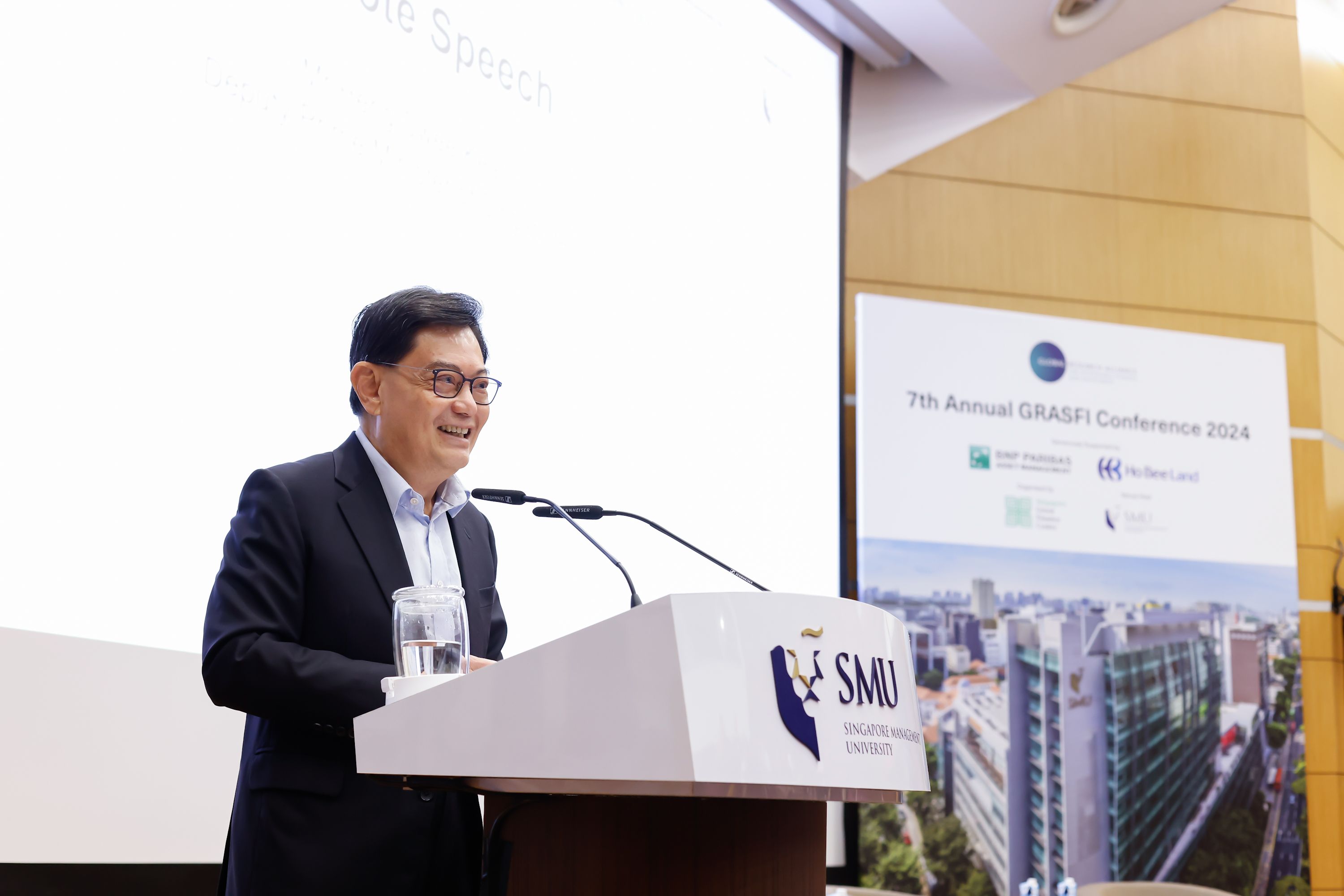
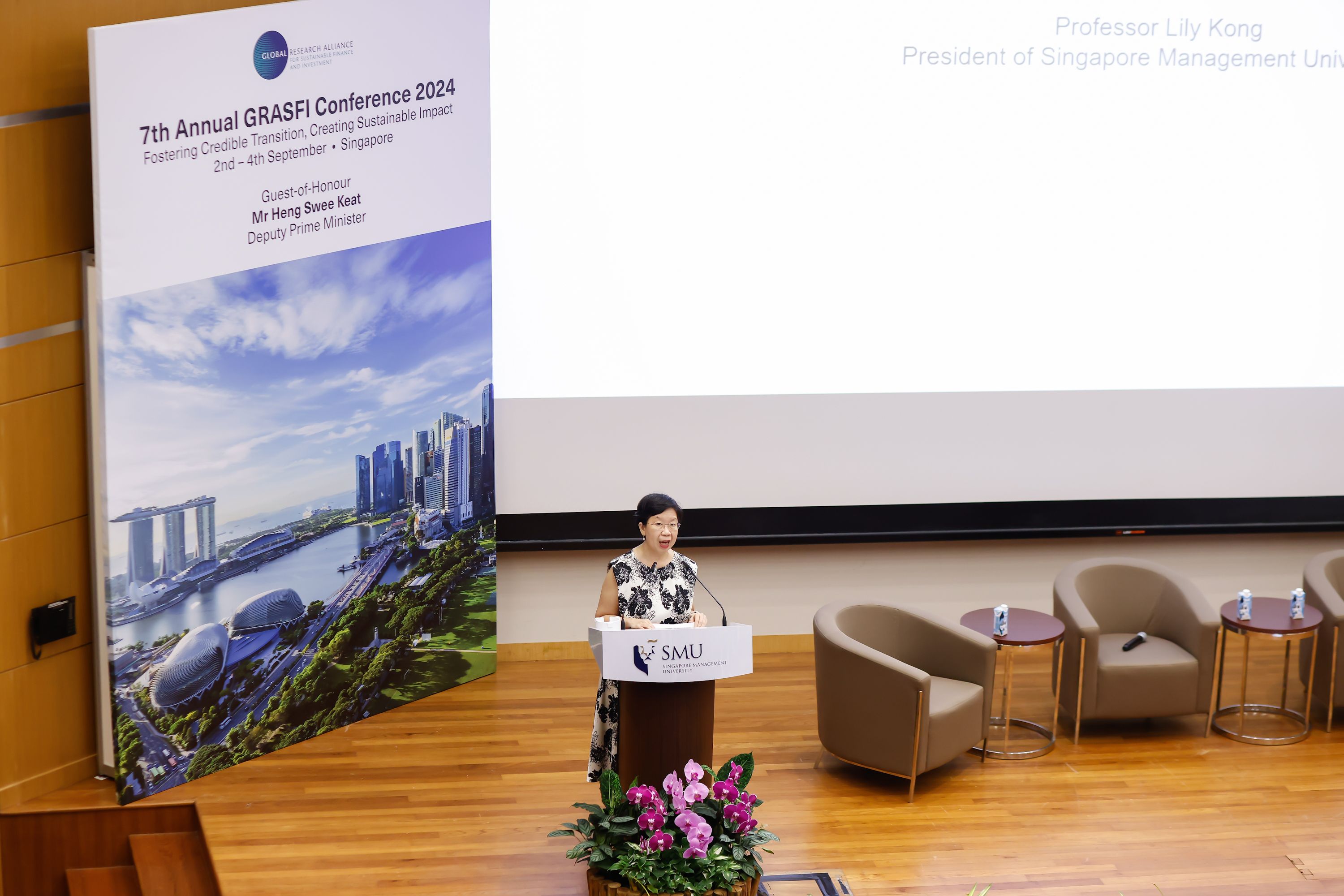
“Academic researchers and practitioners like yourselves can help guide global efforts for decarbonisation and sustainable growth in an objective and science-based manner,” he said. Mr Heng highlighted three areas where these parties can collaborate to advance sustainable finance.
The first area is to develop better definitions and outcome measures of sustainable finance. This helps guide companies and investors in decision-making and reduces the risks of greenwashing. Taxonomies that define sustainable activities are fundamental, and commended efforts now underway to align these taxonomies across jurisdictions, including between Singapore, China and the European Union, to facilitate cross-border transactions by financial institutions.
As an example of how the measurement of the impact of finance on sustainability can be improved, he pointed to SGFC’s development of an Impact Weighted Account Framework to help companies better assess the sustainability impact of their operations and investments. He also singled out a conference paper by Ayako Yasuda and Keer Yang from University of California, Davis, out of 45 being presented at the GRASFI conference, which suggests that clearer labelling of sustainable finance products helps investors make better investment decisions.
The second area is shaping regulations to facilitate sustainable finance flows, while keeping regulatory costs down. This is important as good regulations catalyse the flow of financing to impactful causes such as energy infrastructure, and deep tech innovations to accelerate decarbonisation, he said.
Third, uplifting the skills of the talent base of Sustainable Finance in Singapore is also key. “As part of Singapore’s Sustainable Finance Jobs Transformation Map, we will invest $35 million over the next three years to upskill and reskill our finance professionals,” he shared. He also encouraged academics to develop new teaching modalities to make sustainable finance more accessible, highlighting as an example how SGFC leveraged SMU’s teaching infrastructure to deliver a Massive Open Online Course (MOOC).
How SMU is raising capacity in sustainable finance in Singapore
Over 500 learners have taken the MOOC on ‘Introduction to Sustainability & Sustainable Finance,’ said SMU President Professor Lily Kong shared in her welcome remarks. Besides the MOOC, SGFC rolled out, in April this year, a wide array of courses for sustainable finance professionals, including ‘Climate Change Management’ and ‘Sustainable Investment Management’. Soon, a course on ‘Carbon Markets and Decarbonisation Strategies’ will follow. To date, over 220 finance professionals have completed SGFC courses.
Prof Kong noted SMU is the only university in Southeast Asia to be part of GRASFI, a network of global research universities advancing cutting-edge academic research on sustainable finance and investment since 2020. “We are very privileged to have received the support of the GRASFI Board for the Singapore Green Finance Centre (SGFC) at SMU to organise this premier global conference of academics,” she noted.
She shared that SGFC aims to drive global efforts to combat climate change through two key approaches – by promoting interdisciplinary research and through talent development. SGFC has built strategic partnerships with over 10 universities and organisations across Europe, the United States and Asia in Sustainable Finance and Investing.
As climate pressures intensify, she stressed the urgency of sustainable investment. She said that closing the gaps in public funding to protect against floods, typhoons, and higher temperatures is not enough. “Only with efficient financing mechanisms, innovative financial products, and strongly enforced regulations will we achieve sustainable impact for the long haul,” she stressed.
Zeroing in on measurements in outcomes and safeguards for investors
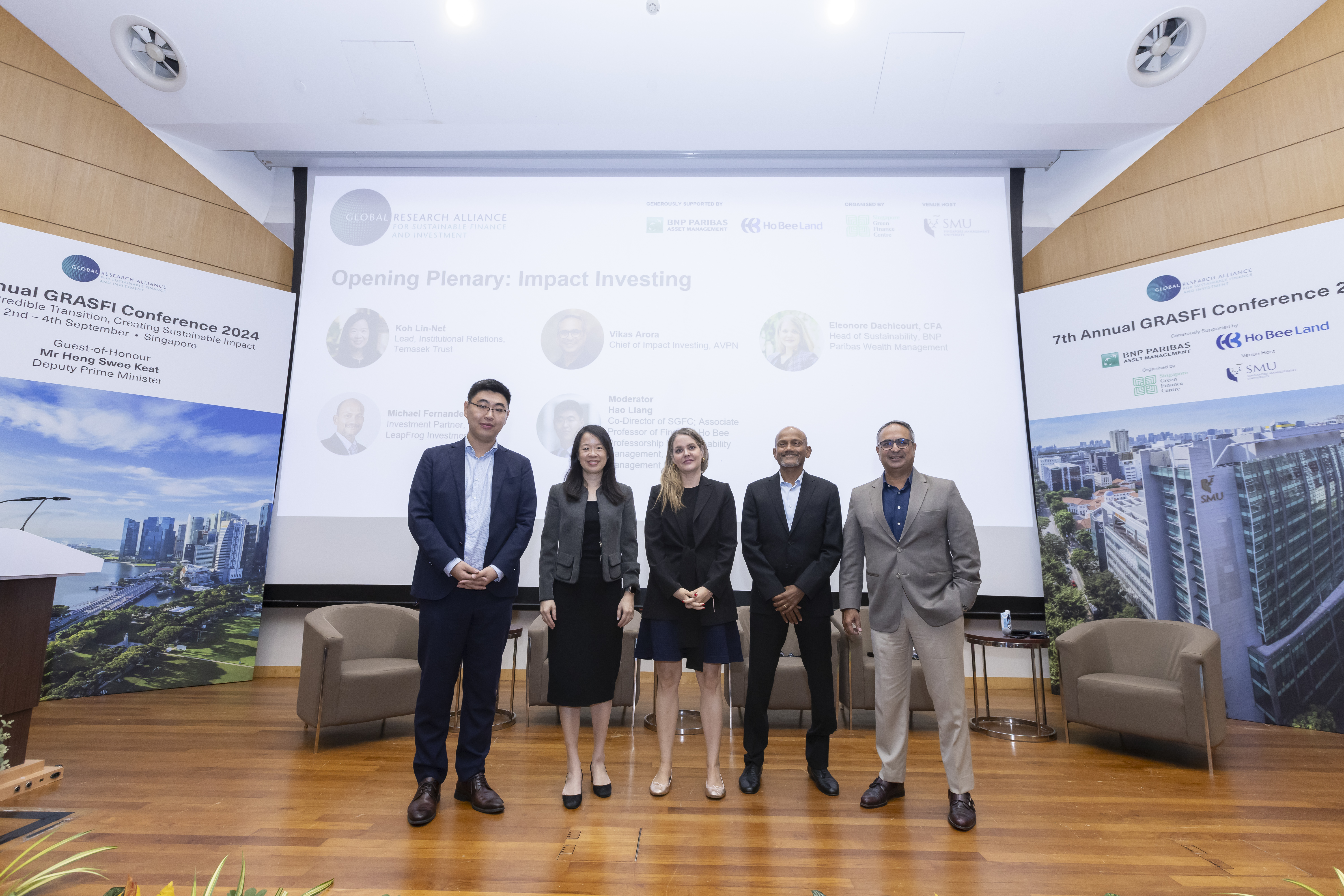
Mr Heng’s keynote speech was followed by a panel discussion on Impact Investing, moderated by Associate Professor of Finance Hao Liang at SMU who is also the Co-Director of the SGFC.
The panellists noted that the value of impact investing, is much harder to measure, compared with carbon accounting. Ms Koh Lin-Net, Lead – Institutional Relations (Temasek Trust), hoped the academic community could help the sector collect the data cost-effectively using technology. While projects with longer time horizons have greater potential to create impact, the panel noted that the challenge is, once again, measurement. Questions remain on what the outcomes are, who is measuring it, the definitions of the outcome and when returns are to kick in.
The conference also saw two other panels led by SGFC Executive Director Nikki Kemp and Professor of Urban Climate Winston Chow. Ms Kemp led the discussion on Nature and Biodiversity Finance, which explored financing safeguards and regeneration for the region’s fragile eco-systems and biodiversity.
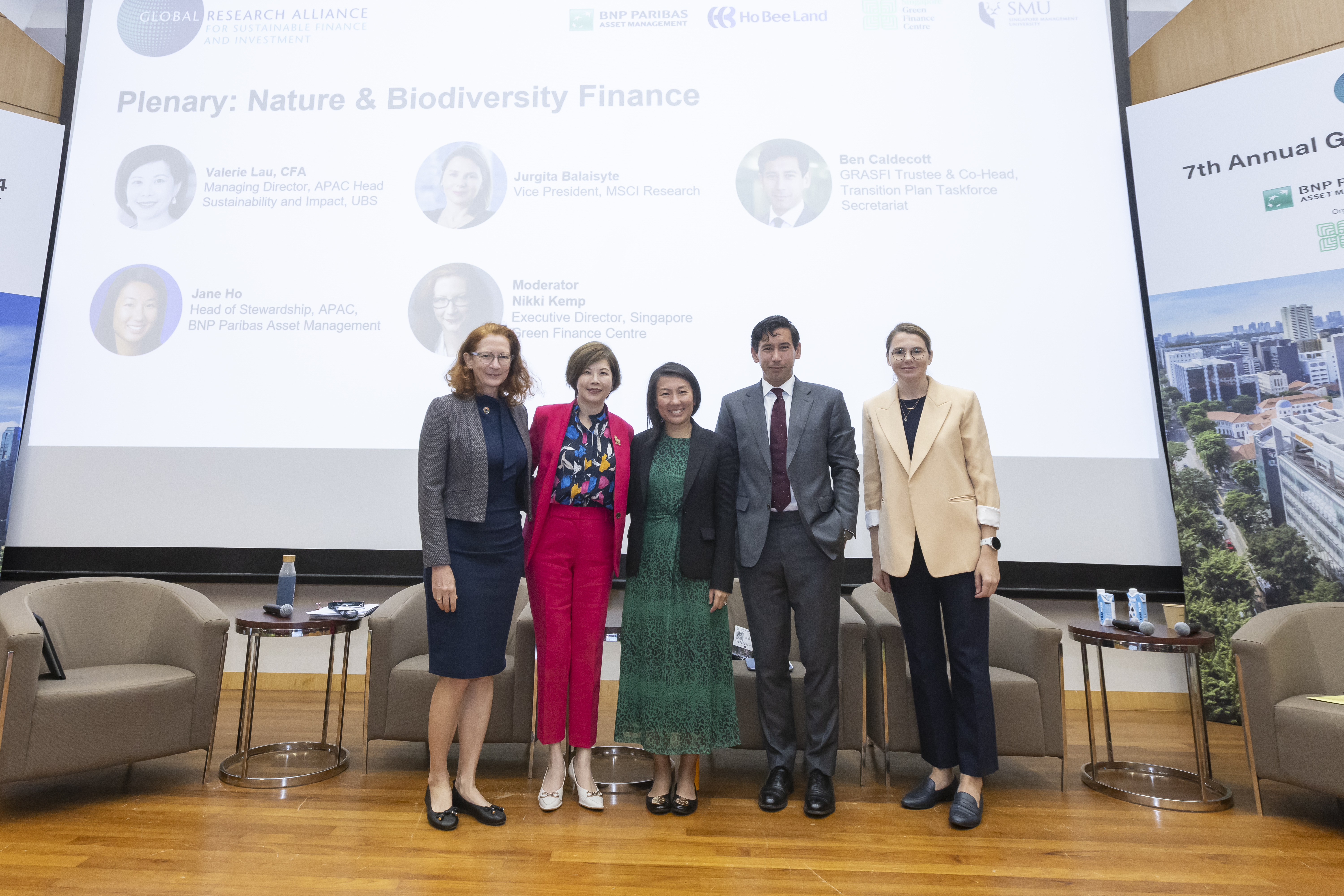
The panel on Nature and Biodiversity Finance highlighted the need for better funding and knowledge to support environmental impact and emphasised the importance of integrating natural capital into financial models. Ms Valerie Lau, APAC Head Sustainability and Impact of UBS and an advisory board member of SGFC, noted that a major roadblock in nature financing is the knowledge and skills-capacity gap. There is a growing need to assess the quality of investable projects and to establish effective measurement approaches for natural capital.
Prof Chow, who is also Co-Chair of Intergovernmental Panel on Climate Change's Working Group 2, was the moderator for a panel on Resilient Cities, focusing on integrating sustainable finance in resilient urban planning across Asia.
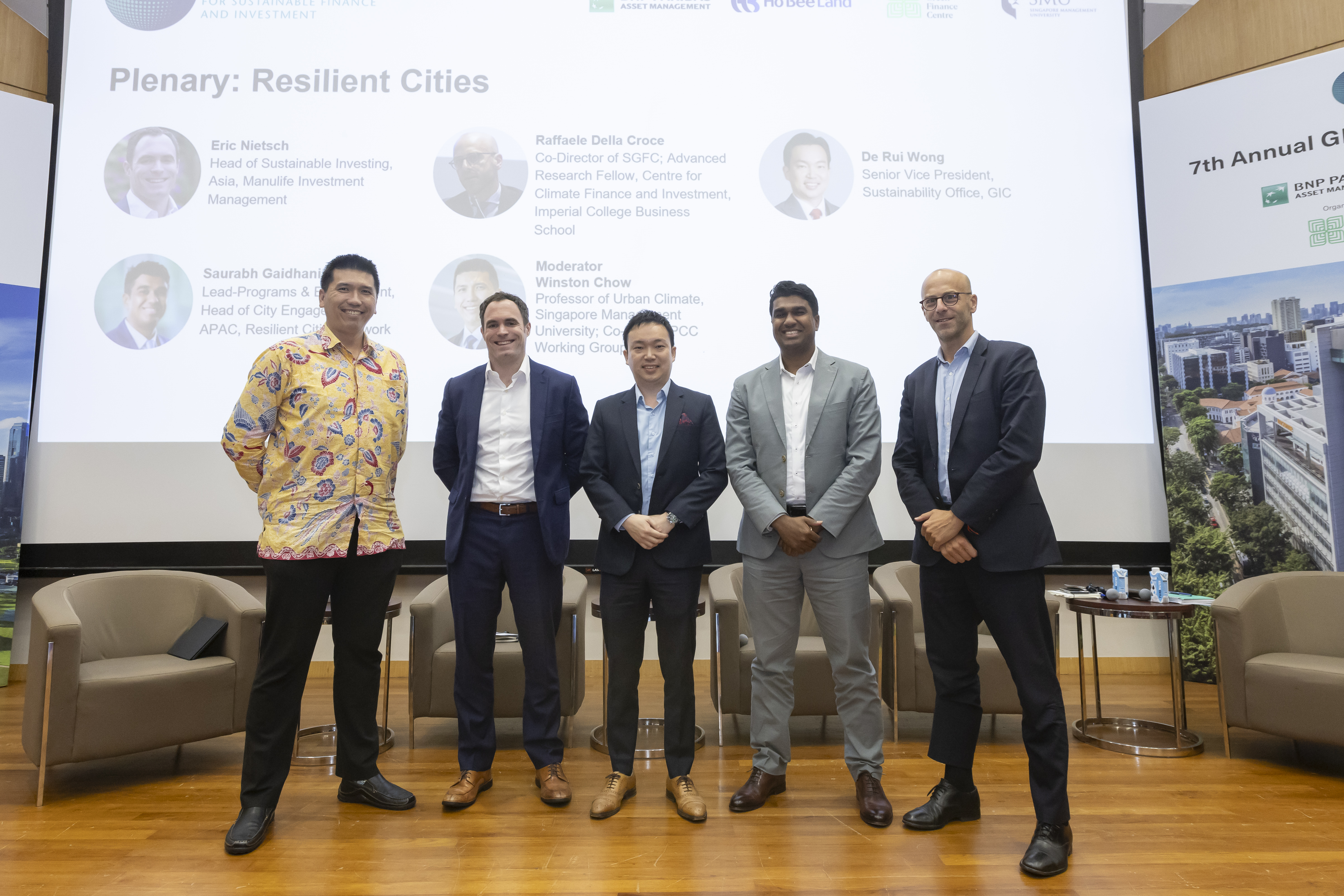
The panel on Resilient Cities emphasised that creating smart, resilient cities requires a blend of innovative approaches, practical interventions, and ongoing adaptation to evolving needs. During the discussion, Dr Della Croce shared his recent SGFC research paper, “Financing Adaptation and Resilience in London and the UK: Moving from Aspiration to Reality – Part II – Urban Adaptation Financing”, co-authored with Stella Whittaker (Copenhagen Business School), Claudia Hlavackova (Imperial College Business School), and Phuong Nguyen (SMU).
The paper examined the current state of adaptation finance in London and compared it with Copenhagen and Singapore. He concluded that there exists an implementation gap beyond the financing and resource gap, and called for the initiation of education and knowledge-sharing in this field.